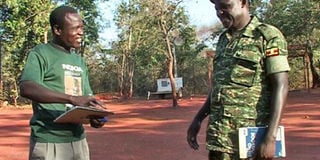Prime
Ongwen speaks out on why he quit LRA

Dominic Ongwen shares a light moment with a UPDF officer at Obo in the Central African Republic last week. Courtesy Photo
What you need to know:
As the former LRA commander arrives at The Hague to face trial, he speaks about life in the bush and how he fell out with Joseph Kony who wanted to kill him.
Kampala
Former Lord’s Resistance Army (LRA) second in command, ‘Maj Gen’ Dominic Ongwen has for the first time spoken out on why he defected.
In an interview at the weekend shortly before he boarded a plane for his trial at the International Criminal Court (ICC), Ongwen revealed how he had fallen out with LRA leader Joseph Kony. He said his relationship with Kony became frosty in 2012 over rumours that he and other commanders planned to defect.
“Since that time, there have been reports that the spirits have been telling Kony every year that I wanted to defect,” Ongwen said. “It took me close to two years without reaching him (Kony). Before meeting him, Kony had ordered a commander called Aligac to have me arrested, tortured and caned 250 strokes. He said if I refused, I should be killed,” he added.
Ongwen said it was Kony’s escort who released him, to save his life, following a nine-day detention in December last year while in Darfur, Sudan.
Ongwen, appearing relaxed amid former foes-turned friends, the UPDF soldiers, also said he was baited by the promise of amnesty during the 2006-2007 Juba peace talks. “I was with Kony at home. Over 10 helicopters came and surrounded us, but somehow, we survived.
From that moment, I started hearing and reflecting on messages about amnesty, some of which I heard during the Juba peace talks. Some commanders such as Alit and Bwone started telling me about it. I kept pondering over it. I slowly started giving up on rebel life,” he said. His longevity with the rebel outfit, he claims, was to open the way for other commanders to defect first.
Asked about his impending trial at the International Criminal Court for war crimes, Ongwen appeared indignant. “I was captured at a tender age, and went there as someone who was blind and deaf. It is the same way in which I returned. And I hope my good intention will be reciprocated by the responsible authorities,” he argued.
To cement his formal transfer - first to the African Union - and then to the ICC, Ongwen put his thumbprint to a document on Friday afternoon. After signing, a dejected Ongwen shook his head in disbelief.
Last week, in an audio recording played on our sister station NTV, Ongwen said the President had forgiven him. However, State House quickly clarified that it’s not the President who grants amnesty.
He however, asked for forgiveness for the atrocities he is alleged to have committed.
“Each of us sin in words, deeds and thoughts. Each of us sin in different ways. If I committed a crime through war, I am sorry. In my mind, I thought war was the best thing.
Even up to now, I dream about war every night. But if they don’t want to forgive me, I leave it in their hands. I have become like a lice, which you remove from your hair or waist and kill without any resistance,” he said resignedly.
His fate now lies with the ICC, where he arrived at the weekend.
The background
On 5 January 2015, the US, working with the African Union (AU) Regional Taskforce in the Central African Republic (CAR), took custody of Dominic Ongwen. On 14 January he was handed over to the Ugandan army contingent of the AU Regional Taskforce. On January 17, the ICC took legal custody of Ongwen in CAR’s capital, Bangu.



